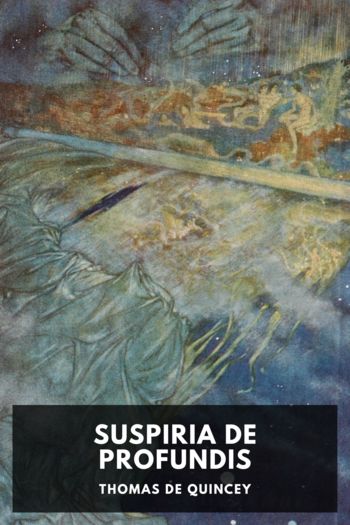Suspiria de Profundis by Thomas De Quincey (urban books to read .TXT) 📕

- Author: Thomas De Quincey
Book online «Suspiria de Profundis by Thomas De Quincey (urban books to read .TXT) 📕». Author Thomas De Quincey
But did I in the meantime feel anger towards Turk? Not the least. And the reason was this:—My guardian, who taught me Latin, was in the habit of coming over and dining at my mother’s table whenever he pleased. On these occasions, he, who like myself pitied dependent animals, went invariably into the yard of the offices, taking me with him, and unchained the dogs. There were two—Grim, a mastiff, and Turk, our young friend. My guardian was a bold, athletic man, and delighted in dogs. He told me, which also my own heart told me, that these poor dogs languished out their lives under this confinement. The moment that I and my guardian (ego et rex meus) appeared in sight of the two kennels, it is impossible to express the joy of the dogs. Turk was usually restless; Grim slept away his life in surliness. But at the sight of us—of my little insignificant self and my six-foot guardian—both dogs yelled with delight. We unfastened their chains with our own hands, they licking our hands; and as to myself, licking my miserable little face; and at one bound they reentered upon their natural heritage of joy. Always we took them through the fields, where they molested nothing, and closed with giving them a cold bath in the brook which bounded my father’s property. What despair must have possessed our dogs when they were taken back to their hateful prisons! and I, for my part, not enduring to see their misery, slunk away when the rechaining commenced. It was in vain to tell me that all people, who had property out of doors to protect, chained up dogs in the same way. This only proved the extent of the oppression; for a monstrous oppression it did seem, that creatures, boiling with life and the desires of life, should be thus detained in captivity until they were set free by death. That liberation visited poor Grim and Turk sooner than any of us expected, for they were both poisoned, within the year that followed, by a party of burglars. At the end of that year, I was reading the Aeneid; and it struck me, who remembered the howling recusancy of Turk, as a peculiarly fine circumstance, introduced amongst the horrors of Tartarus, that sudden gleam of powerful animals, full of life and conscious rights, rebelling against chains—
“Ireque leonum
Vinecla recusantum.”14
Virgil had doubtless picked up that gem in his visits at feeding-time to the caveae of the Roman amphitheatre. But the rights of brute creatures to a merciful forbearance on the part of man could not enter into the feeblest conceptions of one belonging to a nation that (although too noble to be wantonly cruel) yet in the same amphitheatre manifested so little regard even to human rights. Under Christianity the condition of the brute has improved, and will improve much more. There is ample room. For, I am sorry to say, that the commonest vice of Christian children, too often surveyed with careless eyes by mothers that in their human relations are full of kindness, is cruelty to the inferior creatures thrown upon their mercy. For my own part, what had formed the groundwork of my happiness (since joyous was my nature, though overspread with a cloud of sadness) had been from the first a heart overflowing with love. And I had drunk in too profoundly the spirit of Christianity from our many nursery readings, not to read also in its divine words the justification of my own tendencies. That which I desired was the thing which I ought to desire; the mercy that I loved was the mercy that God had blessed. From the Sermon on the Mount resounded forever in my ears—“Blessed are the merciful!” I needed not to add—“For they shall obtain mercy.” By lips so holy, and when standing in the atmosphere of truths so divine, simply to have been blessed—that was a sufficient ratification; every truth so revealed, and so hallowed by position, starts into sudden life, and becomes to itself its own authentication, needing no proof to convince, needing no promise to allure.
It may well be supposed, therefore, that having so early awakened within me what may be philosophically called the transcendental justice of Christianity, I blamed not Turk for yielding to the coercion of his nature. He had killed the object of my love. But, besides that he was under the constraint of a primary appetite, Turk was himself the victim of a killing oppression. He





Comments (0)